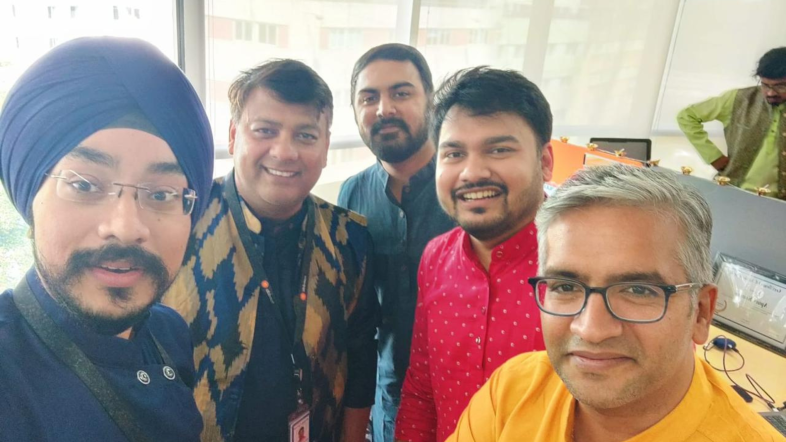- Hi, I am Rahul Kanodia. Initially, I planned to stay at a Big 4 firm, but I realized my 20s were for experimenting.
- Despite salary concerns, I took a leap and joined India1 Payments, backed by private equity.
- Fast forward to 2024, I am a Finance Controller at a Bangalore-based Agri-tech startup valued at $42.5M.
Starting my career at PwC
I never had a clear reason for choosing finance or CA; it was more about following the direction my family pointed me.
After qualifying as a Chartered Accountant in 2016, my goal was to join one of the Big 4 firms, as it seemed like the natural next step.
Around the same time, Goods and Services Tax (GST) was introduced in India, making taxation the most attractive field.
I joined PwC in their GST implementation.
However, after 2.5 years in tax, it was beginning to feel too static. I needed something more dynamic.
So, I switched to audit within the Big 4.
In this role, I gained valuable experience in due diligence, consulting, and working with startups, MSMEs, and listed companies.
I was content working at the Big 4 and planned to stay there for a few more years. But…
Fintech backed by VC and PE
An unexpected opportunity arose to join India1 Payments, which provides Indians with easy access to financial services and is backed by private equity and venture capital.
I knew the learning curve would be steep, but my only concern was, “Will they pay me on time?”
Despite my initial hesitation, conversations with my seniors reassured me that the company had weathered challenges like demonetization without salary issues.
And I joined India1 Payments in August 2019.
Transitioning from the structured environment of a Big 4, where client needs’ drive your work, to a more autonomous role at India1 Payments was a welcome change.
But working in a small team came as a shock to me.
At the Big 4, our team consisted of 200 people, whereas at India1 Payments the entire organization’s headcount was around 200-300.
Honestly, it took me a couple of months to gauge whether joining India1 Payments was the right bet or not.
Fortunately, it turned out to be a pivotal move in my career.
It gave me a holistic view of the industry, including experience in risk assurance, controllership, financial planning and analysis (FP&A) to automation.
We worked on everything at a micro level, including preparing for an IPO by filing the Draft Red Herring Prospectus (DRHP). I acquired invaluable insights.

Yet another career move
My initial goal at India1 Payments was to become CFO. However, after 2.5 years, I realized that achieving this required a deep understanding of various financial aspects at a micro level.
What now?
In November 2021, I moved to Appario – one of Amazon’s largest sellers in India.
Going through seven rounds of interviews and landing the job was a significant achievement, and I felt it would offer me stability and growth in my career.
When I started at Appario, I thought I was going to a place where I could settle down.
Despite the valuable experience I had acquired, I yearned for the hands-on, ground-up building experience that comes with working in a startup.
I realized that it would take me somewhere in my thirties to settle down in my career.
That is when an opportunity came my way at Fasal – a Bangalore-based agri-tech startup, with a valuation of $42.5M as of 2024.
What next?
Also read: Ex-Mensa Finance Controller On Giving Up A Fat Salary To Startup
Agri tech startup as a Financial Controller
Despite having a successful role at Appario, managing a substantial turnover of INR 15K Crores in the electronic segment, I felt drawn to Fasal’s potential.
I was particularly excited about working closely with the founders. At 26, it seemed like a great learning curve!
As Finance Controller at Fasal, my role extended beyond traditional duties. I’ve been responsible for everything from attracting investors to guiding business and product teams.
Establishing rigorous financial disciplines and fundraising became a focal point during my time at Fasal, consuming a significant portion of our efforts.
From bridge rounds to securing $12 million in Series A, navigating the due diligence process with incoming investors was both challenging and rewarding.
While overseeing basic audit and financial hygiene, I devoted substantial time to managing business and legal due diligence processes.
Unlike larger corporations where reporting structures are more defined, Fasal offered a dynamic environment with multiple stakeholders—existing investors, prospective investors, and cross-functional teams.
Balancing these diverse expectations required not just managerial skills but a collaborative mindset.

Qualities Founders look for in a CFO or Finance Controller
After working with the founders at Fasal, I have observed that there are certain qualities they look for in a CFO.
Focus more on financial hygiene and discipline. When I say hygiene and discipline, I’m not just talking about basic controllership – I am referring to a complete 360-degree view.
Balancing Growth and Profitability: It’s not just about scalability anymore; it’s about balancing that sweet spot between growth and profitability.
Getting your hands dirty: Finance professionals need to take a more hands-on approach to get things done. In startups that have raised Series A, B, or C funding and have lean teams, you must execute on the ground.
Managing Stakeholders like foreign or multinational investors is also a challenging task. If you don’t get hands-on with this, you won’t be able to help out.
Technical Skills: Being tech-savvy is good, but do you know how the manual processes run? Will you be able to implement or put automation in place? Do you understand the required technical skill sets? You need to be an all-rounder.
Knowledge of compliance: You need to be aware of company law and external laws related to the specific industry.
I will be honest; when I first joined Fasal, I was not aware of how the Agri industry works. There are several compliances for the Agri industry which I learned when I was a part of Fasal.
I learned on the ground. So, you have to be ready to learn continuously.
Also read: From Big 4 to VC: Insights from the Financial Controller at Blume Ventures.
How is it working with investors?
Contrary to the portrayal in the media, where investors are often seen as demanding or difficult, my experience has been positive.
Investors are supportive and driven by various factors—financial, strategic, or impact-oriented.
They are some of the best people to work with, provided you are transparent, trustworthy, and competent.
Working with investors is all about building a strong personal rapport and maintaining trust through your commitments and deliverables.
Investors typically handle multiple startups simultaneously, which often leaves them with limited time to delve deeply into each venture. As a finance professional, it’s your responsibility to ensure that your interactions with investors are both efficient and valuable.
To achieve this, you must be prepared, proactive, and focused on making the investors’ involvement as seamless as possible.
Understanding investor expectations. It’s important to note that investors seek not just financial returns but also impactful and viable growth.
I always advise finance professionals to understand the investor’s mindset. This understanding allows you to tailor your reporting to their specific interests and concerns.
It’s essential to communicate effectively and ensure that the investors have a clear view of the startup’s progress. This involves presenting information in a way that is both comprehensive and easily digestible.
Remuneration you can expect in a startup
In startup environments, salary negotiations are a whole different ball game compared to traditional industries.
Usually, you would not get paid in peanuts but don’t expect a huge increment either.
Prove yourself and you will see that there is no limit to your earning potential.
Wrapping up…
This is an excellent time for 26 to 30-year-olds to dive into the startup ecosystem.
Venture capitalists (VCs) have become more discerning, focusing on financially viable and healthy startups.
As a result, the risks associated with joining a startup today are significantly lower than it was five years ago, making it a great time to enter this space.
Even if a startup doesn’t yield high returns, the knowledge and skills you gain will be priceless.
Apart from that, I would say you don’t have to wait until you have completed 2 or 3 years with a particular company to feel ready to move on.
If you miss this journey at this age, you may become more stubborn or stagnant, as I have often heard from my seniors.
Opportunities shall be embraced to expand your learning curve. Money will follow—it should not be a constraint and it won’t be after a point in time.
That’s what keeps me moving and taking on new opportunities.







